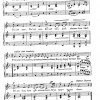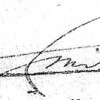Families were large, wages were small and life was a struggle for the working classes in Victorian Britain, especially in rural communities. The well-being of the family often depended as much on the resourcefulness of the wife as on the hard labour of the husband. Mary Roberts was born into the Wareham family of Iwerne Minster and as she grew up her mother instilled in her all the skills and virtues to be a good wife and mother.
She was born Mary Eliza Wareham in 1857 at Iwerne Minster, but known as Polly. The daughter of agricultural labourer Benjamin Wareham and his wife Sarah, she was the sister of William Wareham about whom we have written elsewhere on the site. (see: William Wareham 1860-1961 in the Real Lives Category). During her teenage years she spent a little time in Battersea, London, with Joseph Aldworth, an Irishman, and his Dorset born wife Ann, whose mother was Irish.
In 1878 at the age of 21 she married a young man from her village named Frank Roberts. He was employed as an agricultural labourer on the Iwerne Minster estate, though in the early days of their marriage they lived at Shroton (Iwerne Courtney), until a cottage became available on the estate. Here at Till Hayes Cottage, they lived for many years. Polly and Frank had twelve children including two twin girls; sadly one died aged one year and the other aged 12. They also lost a son to the First World War. Later, when her eldest girls had left home and gone into service, Polly took in two homeless children. Later, she brought up her orphaned granddaughter, who wrote warmly about her grandmother: “This patient, kind woman lived the religion she professed every moment of every day, day after day. No matter how demanding and exhausting her own troubles and household duties, she made it her Christian duty to go to help, freely, anyone in the village who was ill or in need.”
Life was a constant struggle for the lowly paid agricultural worker and his wife. Their little bits of furniture were mainly the work of Frank Roberts who, though not a carpenter, had a talent for woodcarving.
They kept chickens, a pig and grew their own vegetables. Each year after the grain had been harvested and with the farm Bailiff’s permission, Polly took the children into the fields to glean the ears of corn left on the ground; this was fed to the chickens. For a while the family had a goat that, by all accounts, was quite a character and fond of slipping his tether and trotting off to meet the eldest lad from school.
On occasions the family was so hard-up Polly had to keep the younger children away from school because they had no boots to wear; footwear for a family of twelve was a big item to come out of the family’s small budget. Her granddaughter tells of Polly walking the twelve miles to Blandford and back to buy boots for the children and recalls: “one evening on her way back from Blandford Polly decided to take a short cut across a field at Steepleton. It seems she fell over a cow that was resting peacefully in the darkness.” We don’t know who was the more surprised – Polly with her upturned pram or the cow!
In those times of austerity Polly was rarely able to serve meat to the family, except when the family pig was killed and at Christmas when the estate owner gave his workmen a joint of beef. In the kitchen, hanging over the fire a large pot of stew would be cooking: it was made by boiling some bones with vegetables and dumplings.
Always having to think ahead, Polly would make as much jam as she could during the season from the plentiful fruit in her garden. She would make large apple dumplings and boil them in cloths in the copper. Her granddaughter tells us: “she made what the children called ‘stirred in’ apple puddings,” that were made the same way. She had a small bread oven but often took the bread, wrapped in cloth, in a wheelbarrow to be baked along with her sister-in-law’s loaves. The family could only afford to have butter or margarine on Sundays. At the start of a meal each child had to eat one thick slice of bread as a filler before being allowed any jam or dripping.
Saturday was a particularly busy day for Polly. She cleaned and dusted the Baptist Chapel, did all her own housework and cooking and made sure all the mending was complete. Scissors and needles were put away on Saturday night as were all tools. Polly laid out everyone’s best clothes and polished all the family boots and lined them in a row ready for Sunday when all the family would attend all of the services at the Chapel.
During the autumn of 1905 there was an epidemic of diphtheria. Polly’s husband, two of their boys and three of the younger girls were all ill. Day and night Polly nursed them all but the family lost the second of the twin girls.
Polly would be the first to help others in difficulty: she was present at most births and deaths in the village, acting as mid-wife, nurse and friend. This was before the network of District Nurses was set up. Those she helped often sent gifts of second hand clothing to her cottage and, as she could afford to buy new clothes only occasionally, she would get busy with her needle and scissors, altering these gifts to fit the family. Although poor, her children were always turned-out neat and tidy. She took in sewing and washing from the gentry to subsidise her meagre housekeeping allowance and to make ends meet.
Polly was often heard to say: “Where there’s a will, there’s a way” and “Waste not, want not,” was another of her favourite expressions, as was: “Shan’t let myself be beaten” and she rarely was. This ingenious and resourceful lady confronted the trials that a hard life sent her way. She was a good woman, good mother, good wife and she taught her children to reverence God and to pray.
At the age of seventy-two, having been a widow for fourteen years, this
wonderful lady became worn out with physical effort and took to her bed, where she lay ill for six long years, attended by two of her devoted daughters. Mary ‘Polly’ Roberts passed away in the spring of 1935.



